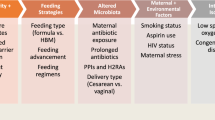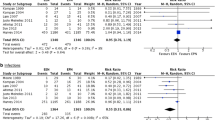Abstract
Background
In this study we sought to ascertain a critical threshold of the degree of prematurity and long-term digestive morbidity of the offspring.
Methods
A population-based cohort analysis was conducted, comparing long-term incidence of digestive morbidity in infants born preterm. Cases were divided into four groups according to the extremity of prematurity. Digestive morbidity included hospitalizations involving a predefined set of ICD9 codes. A Kaplan–Meier survival curve was constructed to compare cumulative incidence of digestive morbidity. A Cox proportional hazards model was used to control for confounders.
Results
During the study period 220,563 patients met the inclusion criteria. Offspring born preterm had significantly more hospitalizations due to digestive morbidity compared to term offspring. The Kaplan–Meier survival curve demonstrated significant higher cumulative incidence of long-term digestive morbidity of the offspring with decreasing gestational age (Log rank p < 0.001). The risk was highest at 28 weeks gestation. Using a Cox proportional hazards model, being born at very and moderate to late preterm birth was independently associated with long-term digestive morbidity.
Conclusion
Preterm delivery is an independent risk factor for long-term digestive morbidity of the offspring. In our population, 28 weeks gestation is the critical cut-off for pronounced digestive morbidity.



Similar content being viewed by others
References
Romero R, Dey SK, Fisher SJ (2014) Preterm labor: one syndrome, many causes. Science 345(6198):760–765
Harrison MS, Goldenberg RL (2016) Global burden of prematurity. Semin Fetal Neonatal Med 21(2):74–79
McLean M, Bisits A, Davies J, Woods R, Lowry P, Smith R (1995) A placental clock controlling the length of human pregnancy. Nat Med 1(5):460–463
Bhattacharya S, Raja EA, Mirazo ER, Campbell DM, Lee AJ, Norman JE et al (2010) Inherited predisposition to spontaneous preterm delivery. Obstet Gynecol 115(6):1125–1133
Cohen R, Gutvirtz G, Wainstock T, Sheiner E (2019) Maternal urinary tract infection during pregnancy and long-term infectious morbidity of the offspring. Early Hum Dev 136:54–59
Elbaz G, Fich A, Levy A, Holcberg G, Sheiner E (2005) Inflammatory bowel disease and preterm delivery. Int J Gynaecol Obstet 90(3):193–197
Valkenburg-van den Berg AW, Sprij AJ, Dekker FW, Dörr PJ, Kanhai HHH (2009) Association between colonization with Group B Streptococcus and preterm delivery: a systematic review. Acta Obstet Gynecol Scand. 88(9):958–967
Gutvirtz G, Wainstock T, Landau D, Sheiner E (2019) Maternal smoking during pregnancy and long-term neurological morbidity of the offspring. Addict Behav 88:86–91
Kiely JL (1998) What is the population-based risk of preterm birth among twins and other multiples? Clin Obstet Gynecol 41(1):3–11
Walfisch A, Kabakov E, Friger M, Sheiner E (2017) Trends, seasonality and effect of ambient temperature on preterm delivery. J Matern Fetal Neonatal Med 30(20):2483–2487
Lenfestey MW, Neu J (2018) Gastrointestinal development: implications for management of preterm and term infants. Gastroenterol Clin North Am. 47(4):773–791
Yee WH, Soraisham AS, Shah VS, Aziz K, Yoon W, Lee SK (2012) Incidence and timing of presentation of necrotizing enterocolitis in preterm infants. Pediatrics 129(2):298
Shulhan J, Dicken B, Hartling L, Larsen BM (2017) Current knowledge of necrotizing enterocolitis in preterm infants and the impact of different types of enteral nutrition products. Adv Nutr (Bethesda, Md). 8(1):80–91
Juhl SM, Gregersen R, Lange T, Greisen G (2019) Incidence and risk of necrotizing enterocolitis in Denmark from 1994–2014. PLoS ONE 14(7):e0219268
Neu J (2018) Necrotizing enterocolitis. Semin Fetal Neonatal Med 23(6):369
Nowicki PT (2005) Ischemia and necrotizing enterocolitis: where, when, and how. Semin Pediatr Surg 14(3):152–158
Murdoch EM, Sinha AK, Shanmugalingam ST, Smith GCS, Kempley ST (2006) Doppler flow velocimetry in the superior mesenteric artery on the first day of life in preterm infants and the risk of neonatal necrotizing enterocolitis. Pediatrics 118(5):1999–2003
Abu-Ghanem S, Sheiner E, Sherf M, Wiznitzer A, Sergienko R, Shoham-Vardi I (2012) Lack of prenatal care in a traditional community: trends and perinatal outcomes. Arch Gynecol Obstet 285(5):1237–1242
Preterm birth. https://www.who.int/news-room/fact-sheets/detail/preterm-birth. Accessed 15 Feb 2020
Voskamp BJ, Kazemier BM, Ravelli AC, Schaaf J, Mol BW, Pajkrt E (2013) Recurrence of small-for-gestational-age pregnancy: analysis of first and subsequent singleton pregnancies in The Netherlands. Am J Obstet Gynecol. 208(5):374.e1–6
Leybovitz-Haleluya N, Wainstock T, Sheiner E (2019) Maternal preeclampsia and the risk of pediatric gastrointestinal diseases of the offspring: a population-based cohort study. Pregnancy Hypertens 17:144–147
Amitai A, Wainstock T, Sheiner E, Walfisch A, Landau D, Pariente G (2019) The association between pregnancies complicated with isolated polyhydramnios or oligohydramnios and offspring long-term gastrointestinal morbidity. Arch Gynecol Obstet 300(6):1607–1612
Nair J, Longendyke R, Lakshminrusimha S (2018) Necrotizing enterocolitis in moderate preterm infants. Biomed Res Int 2018:4126245
AlFaleh K, Anabrees J (2014) Probiotics for prevention of necrotizing enterocolitis in preterm infants. Evid Based Child Health 9(3):584–671
Lin L, Xia X, Liu W, Wang Y, Hua Z (2019) Clinical characteristics of neonatal fulminant necrotizing enterocolitis in a tertiary Children’s hospital in the last 10 years. PLoS ONE 14(11):e0224880
Hong CR, Han SM, Jaksic T (2018) Surgical considerations for neonates with necrotizing enterocolitis. Semin Fetal Neonatal Med. 23(6):420–425
Carr BD, Gadepalli SK (2019) Does surgical management alter outcome in necrotizing enterocolitis? Clin Perinatol. 46(1):89–100
Elfvin A, Dinsdale E, Wales PW, Moore AM (2015) Low birthweight, gestational age, need for surgical intervention and gram-negative bacteraemia predict intestinal failure following necrotising enterocolitis. Acta Paediatr 104(8):771–776
Eichenwald EC (2018) Diagnosis and management of gastroesophageal reflux in preterm infants. Pediatrics. https://doi.org/10.1542/peds.2018-1061
Satrom K, Gourley G (2016) Cholestasis in preterm infants. Clin Perinatol 43(2):355–373
Said MB, Hays S, Maucort-Boulch D, Oulmaati A, Hantova S, Loys C et al (2014) Gut microbiota in preterm infants with gross blood in stools: a prospective, controlled study. Early Hum Dev 90(10):579–585
Green DS, Abdel-Latif ME, Jones LJ, Lui K, Osborn DA (2019) Pharmacological interventions for prevention and treatment of upper gastrointestinal bleeding in newborn infants. Cochrane Database Syst Rev. 7:011785
Watkins DJ, Besner GE (2013) The role of the intestinal microcirculation in necrotizing enterocolitis. Semin Pediatr Surg 22(2):83–87
Israel EJ (1994) Neonatal necrotizing enterocolitis, a disease of the immature intestinal mucosal barrier. Acta Paediatr Suppl 396:27–32
Hsueh W, Caplan MS, Tan X, MacKendrick W, Gonzalez-Crussi F (1998) Necrotizing enterocolitis of the newborn: pathogenetic concepts in perspective. Pediatr Dev Pathol. 1(1):2–16
Treszl A, Tulassay T, Vasarhelyi B (2006) Genetic basis for necrotizing enterocolitis-risk factors and their relations to genetic polymorphisms. Front Biosci. 11:570–580
Funding
This research received no external funding.
Author information
Authors and Affiliations
Contributions
OO: Writing original draft, visualization; TW: Formal analysis, conceptualization, development or design of methodology, validation, writing review and editing; ES: Conceptualization, writing review and editing, supervision; TL: Language editing, writing review and editing; GP: Conceptualization, writing review and editing, supervision.
Corresponding author
Ethics declarations
Conflict of interest
The authors declare no conflict of interest.
Ethical approval
All procedures performed in studies involving human participants were in accordance with the ethical standards of the institutional and/or national research committee and with the 1964 Helsinki Declaration and its later amendments or comparable ethical standards.
Informed consent
Informed consent was obtained from all individual participants included in the study.
Additional information
Publisher's Note
Springer Nature remains neutral with regard to jurisdictional claims in published maps and institutional affiliations.
This study was conducted as part of the requirements for MD degree from the Goldman Medical School at the Faculty of Health Sciences, Ben-Gurion University of the Negev.
Supplementary Information
Below is the link to the electronic supplementary material.
Rights and permissions
About this article
Cite this article
Ohana, O., Wainstock, T., Sheiner, E. et al. Long-term digestive hospitalizations of premature infants (besides necrotizing enterocolitis): is there a critical threshold?. Arch Gynecol Obstet 304, 455–463 (2021). https://doi.org/10.1007/s00404-021-06068-w
Received:
Accepted:
Published:
Issue Date:
DOI: https://doi.org/10.1007/s00404-021-06068-w




